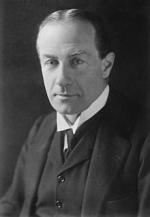Disable ads!
Stanley Baldwin
Stanley Baldwin, 1st Earl Baldwin of Bewdley, KG PC FRS (3 August 1867 – 14 December 1947) was a British Conservative politician, who dominated the government in his country between the two world wars. Three times Prime Minister, he is the only premier to have served under three monarchs (George V, Edward VIII and George VI). Baldwin first entered the House of Commons in 1908 as the Member of Parliament for Bewdley, and held government office in the coalition ministry of David Lloyd George. In 1922, Baldwin was one of the prime movers in the withdrawal of Conservative support from Lloyd George; he subsequently became Chancellor of the Exchequer in Bonar Law's Conservative ministry. Upon Law's resignation due to health reasons in May 1923, Baldwin became Prime Minister and Conservative Party leader. He called an election on the issue of tariffs and lost the Conservatives' majority, after which Ramsay MacDonald formed a minority Labour government. After winning the 1924 General Election Baldwin formed his second government, which saw important tenures of office by Sir Austen Chamberlain (Foreign Secretary), Winston Churchill (at the Exchequer) and Neville Chamberlain (Health). That government also saw the General Strike in 1926 and the 1927 Trades Disputes Act to curb the powers of trade unions, although Baldwin was supportive of Labour politicians at Westminster forming minority governments. Baldwin lost the 1929 General Election and his continued leadership was subject to criticism by the press barons Rothermere and Beaverbrook. In 1931, Labour Prime Minister Ramsay MacDonald formed a National Government, most of whose ministers were Conservatives and which won an enormous majority at the 1931 General Election. As Lord President of the Council, Baldwin took over many of the Prime Minister's duties due to MacDonald's failing health. This government saw an Act delivering increased self-government for India, a measure opposed by Churchill and by many rank-and-file Conservatives. As party leader Baldwin made many striking innovations, such as clever use of radio and film that made him highly visible to the public and strengthened Conservative appeal. In 1935, Baldwin replaced MacDonald as Prime Minister of the National Government, and won the 1935 General Election with another large majority. During this time, he oversaw the re-armament process of the British military as well as the abdication of King Edward VIII. Baldwin's third government saw a number of crises in foreign affairs, including the public uproar over the Hoare-Laval Pact, Hitler's reoccupation of the Rhineland and the outbreak of the Spanish Civil War. Baldwin retired in 1937 and was succeeded by Neville Chamberlain. At that time he was regarded as a popular and successful prime minister, but for the final decade of his life, and for many years afterwards, he was vilified for having presided over high unemployment in the 1930s and as one of the "Guilty Men" who had tried to appease Adolf Hitler and who had – supposedly – not rearmed sufficiently to prepare for the Second World War. By 2004, however, historians generally painted a positive portrait of his governments. Ball says, Baldwin is now seen as having done more than most and perhaps as much as was possible in the context, but the fact remains that it was not enough to deter the aggressors or ensure their defeat. Less equivocal was his rediscovery as a moderate and inclusive Conservative for the modern age, part of a 'one nation tradition'. This more positive outlook on Baldwin's time as Prime Minister is reflected in Evaluations by scholars, where he generally ranked in the middle of British Prime Ministers.
 Read more on wikipedia.org Read more on wikipedia.org
 All quotes by Stanley Baldwin All quotes by Stanley Baldwin
 Edit Edit
|

|
|
|
|
|
Background photo by Giuliana
|